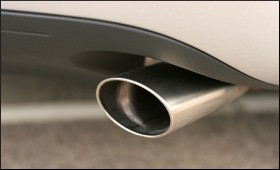|

|
New fuel economy standards for vehicles in US
|
|

|
|
| Top Stories |
 |
|
|
|
DPA | 02 Apr, 2010
US regulators on Thursday finalised new fuel efficiency rules for cars and light trucks, raising fuel economy standards and for the first time regulating greenhouse-gas emissions blamed for global warming.
The announcement is part of a broader pledge by President Barack Obama to shift the US economy towards cleaner forms of energy and curb climate change, though efforts to achieve comprehensive reforms have so far floundered in Congress.
The Obama administration will by 2016 require carmakers to reach an average of 15.1 km per litre across their fleet of models, up from the current 11.6 km per litre. The rule also requires an average carbon dioxide emission level of 155 grams per kilometre.
The new standards will be introduced gradually, starting in 2012. Lisa Jackson, head of the Environmental Protection Agency (EPA), called it a 'historic' standard that would be a 'win-win programme for our economy and our environment'.
Obama first directed his administration to raise fuel economy standards in May 2009 in an effort to curb pollution from vehicles, which account for about one quarter of all climate-damaging emissions from the US.
The new rules were welcomed by environmentalists and carmakers, who had agreed to back the higher fuel economy requirements after talks with the Obama administration last year.
General Motors Co in a statement said: 'While these requirements are very challenging, we feel confident that GM will be able to achieve the mandated fleet fuel economy targets.'
Separately, GM announced that the first Chevy Volt had rolled off the factory production line. The plug-in hybrid, which enters mass production later this year, is a central element of GM's strategy to green its car fleet.
The Volt is powered by an electric motor with a range of about 64 km, after which a petrol motor kicks in that extends its range by nearly 500 km.
GM's plans are part of a wider trend in the industry towards petrol-electric hybrids and other greener vehicles. Japanese maker Nissan will later this year begin selling its all-electric Leaf model.
The higher fuel economy standards were estimated to cost carmakers $52 billion and will add about $950 to the cost of each vehicle by 2016, the EPA estimated.
Jackson argued consumers will make up the difference in lower petrol costs. The administration also argues the new standards will ultimately save 1.8 billion barrels of oil.
Obama supports a more comprehensive clean energy bill that would impose a pollution cap on most industries. Yet talks have stalled in the US Senate amid stiff opposition from conservatives and some fellow Democrats over its potential costs to the economy.
|
|
|
| |
|
|
|
|
|
|
|
|
|
|
|
|
|
|
| |
| Customs Exchange Rates |
| Currency |
Import |
Export |
US Dollar
|
66.20
|
64.50 |
UK Pound
|
87.50
|
84.65 |
Euro
|
78.25
|
75.65 |
| Japanese
Yen |
58.85 |
56.85 |
| As on 13 Aug, 2022 |
|
|
| Daily Poll |
 |
 |
| PM Modi's recent US visit to redefine India-US bilateral relations |
|
|
|
|
|
| Commented Stories |
 |
|
|
|
|
|
| |
|